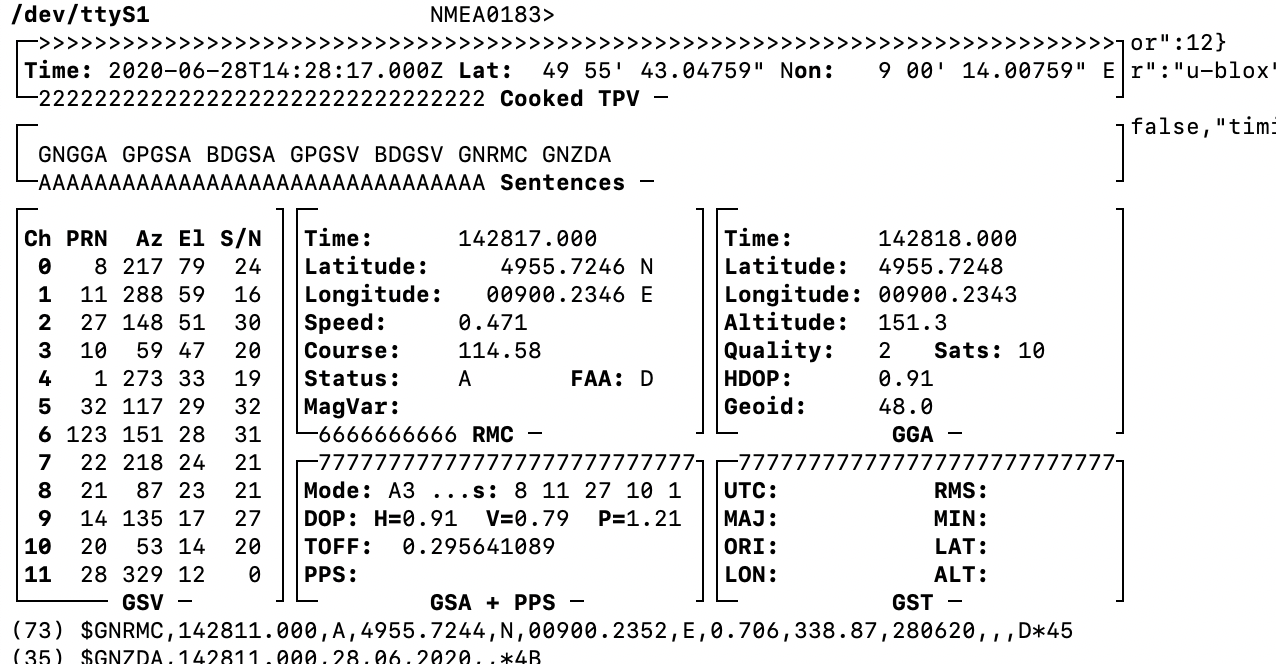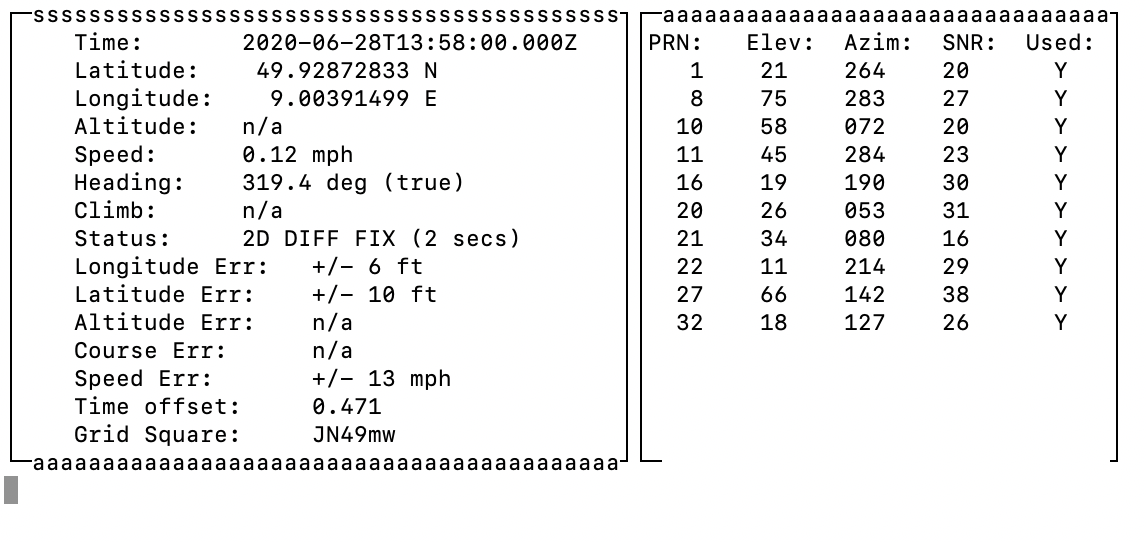Is it possible to use ogps for a generic GPS tracker
-
@Radek There is a way to change the baudrate but it involves recompiling the program in question.
What you have on the screen looks definitely like a baudrate problem. Could you please install stty (can't remember the package right now) and then run
stty -F /dev/ttyS0after you get the output above. This should show you what baudrate has been set for the terminal (I expect 4800). Then you could try setting the baudrate to something new (ugps only does this during start-up) withstty -F /dev/ttyS0 9600.
While this is not a final/proper solution it should get you what you want right now. Ideally ugps gets a command line option to match the speed of the GPS unit.
-
@Radek looking at the code you can get some more debugging if you add -d 7 to the commandline in the procd script or you could use set the environment variable DBGLVL to 7. Then you should get some debugging info. Also you could add -S to the commandline so it will log to stderr.
-
ok, I am really despaired.
When I have ogps installed:
- When I ask baud rate with stty it gives me 4800
- I'm trying to change the baud rate to 9600 (with stty) it won't let me
- When I'm reading the ttyS0 with cat it gives me junk
- When I'm reading the ttyS0 with screen with 9600 baud rate it gives me junk
When I remove ogps :
- When I ask baud rate with stty it gives me 9600
- When I'm reading the ttyS0 with cat it gives me proper informations
- When I'm reading the ttyS0 with screen with 9600 baud rate it gives me proper informations
I enabled also debug but it won't return anything.
Any clues?
Regards,
Radek
-
@Radek said in Is it possible to use ogps for a generic GPS tracker:
ok, I am really despaired.
Relax, we get this sorted.
When I have ogps installed:
- When I ask baud rate with stty it gives me 4800
- I'm trying to change the baud rate to 9600 (with stty) it won't let me
OK, I assume this is because the device is already open (in use), my mistake. What's the exact error message?
I'm away from my h/w at the moment but I can have a look on Monday how we can convince ugps to run with a different baudrate.
-
@Radek @Marko-Lukat From the code we can see the device is opened at 4800:
if (nmea_open(device, &stream, B4800) < 0)
I'm not sure why this is the case.
-
@Radek I updated the code to set baud rate to 9600, you can see if it works or not, I can't test as I don't have an LTE device.
I built it for you to try, you can find the binary here:
-
ok, so I decided to start from scratch. I reseted my Omega2+ to factory settings. Then installed stty, and screen.
Now the default baud rate for ttyS0 is set to 115200 which kinda make sense as it is the baud rate you can see in docs should be the default.
I checked the ttyS1 and the baud rate is by default set to 9600 so I connected the tracker to the ttyS1
After this:- I can read it with
catand it gives me correct data. - I can read it with
screenand it gives me correct data as well.
As next I installed ogps, configured it to use ttyS1. Then run
ubus call gps infobut still no signal.
Then I replaced the/usr/sbin/ugpswith the version provided by @crispyoz (a huge, huge thanks for it) runubus call gps infoand not getting signal as well.Following it I installed
gpsdandgpsd-clients, configured it. After runninggpsmonand can see following
So that seems to be working fine. Also
cgps -sseems to be working fine:
I could of course try to use gpsd but I would really prefer to get ogps working.
Another question is: can I change the baud rate of ttyS0? Because I need also to connect the GSM module which also requires baud rate of 9600.
If I understand it correctly the baud rate of 115200 is set by the operating system because Omega2 is sending login data during boot process. If I am not wrong in regular Linux I could change the kernel boot option but I don't know how to do this in Omega.
Oh yes, and I can't change the baud rate using
stty. When I try to executestty -F /dev/ttyS0 9600it just hang until I kill it with ctrl+cSo here I am right now. Thanks a lot for your help guys
- I can read it with
-
@Radek This being Monday I verified that ogps9600 does in fact work with a 9600 baud terminal interface (
 @crispyoz). However, I had cases where it simply got stuck. My test sequence is that I feed an external 4800 baud stream into ttyS1 which I then change to 9600 baud and see if ugps recovers. The problem here was that if I feed garbage for too long there was no recovery. If the interval is short enough everything turns out ok.
@crispyoz). However, I had cases where it simply got stuck. My test sequence is that I feed an external 4800 baud stream into ttyS1 which I then change to 9600 baud and see if ugps recovers. The problem here was that if I feed garbage for too long there was no recovery. If the interval is short enough everything turns out ok.I'd like you to test the executable from my github repo. This is also hardwired to 9600 baud but it also writes the callback buffer to a logfile (/tmp/oink.log, don't ask).
- download
chmod +x ugps9600+logging- stop any other ugps task
./ugps9600+logging /dev/ttyS1 &
If everything works out the logfile will keep growing and you can see effectively how all the NMEA sequences build up.
If you think it's stuck (ubus command doesn't show anything for an extended length of time) check the logfile, my assumption here is that it will have stopped growing at this point. Each line in said file is the buffer length followed by a hex entry count followed by the buffer content (in brackets), e.g.
14, 0000000E: [[random garbage]]When it gets stuck for me the buffer has grown to a size of 4K which is critical as from this point onward there won't be any more message callbacks to ugps. IOW no recovery. My guess would be that this is the buffer limit for ustream and unless you consume its data you won't get any new stuff.
I'm toying with an idea to force a flush/consumption if the buffer grows unreasonably large for valid NMEA but lets figure out your issue first.
-
@Marko-Lukat This seems like classic buffer overrun behaviour which would make sense since you're feeding the terminal at double the rate.
-
Guys, as first I would just like to say, I'm involved in an Open Source project and participate in few others and I really don't remember to ever encounter such a friendly and helpful community. I really thank you so much.
@Marko-Lukat : sadly it still doesn't work for me and the log file (nice name) is being actually filled with correct data. I'm pretty sure I'm screwing something.
Attaching the log file.
Sorry, wasn't able to upload for some reason. Here it is: https://cloud.sigsiu.net/f/d3d210f48188414581e0/
-
wow, wait, it looks like the coordinates in the file are multiplied about 100 times
-
@Radek said in Is it possible to use ogps for a generic GPS tracker:
wow, wait, it looks like the coordinates in the file are multiplied about 100 times
That's how it is defined. Don't worry.
BUT ... ugps is hardwired for $GP on the sequences it accepts (RMC/GGA/VTG/TXT). And your device delivers $GN. Ouch! Looks like we need a lot of fixes!
- configurable baudrate (at least 4800..115200)
- ignore initial two letters
- potentially fix callback starving
Just noticed that your first data dump shows $GP sentences, but the logfile uses $GN where it matters ... otherwise we'd have spotted it earlier.
-
A new test version is available from github. Baudrate can now be specified with the -b parameter, NMEA sentence filtering is now more relaxed.
-
Wow, we are definitely a step further. When I start the version @Marko-Lukat provided with
ugps -b 9600 -S -d 7 /dev/ttyS1this is what I am getting:root@Omega-9A9F:~# ugps -b 9600 -S -d 7 /dev/ttyS1 Failed to add object: Invalid argument ugps: date: 2020-06-30T19:51:08 UTC ugps: position: 49.928734 9.003940 ugps: height: 149.8 ugps: date: 2020-06-30T19:51:09 UTC ugps: position: 49.928734 9.003942 ugps: height: 149.5 ugps: date: 2020-06-30T19:51:10 UTC ugps: position: 49.928734 9.003942 ugps: height: 149.1 ugps: date: 2020-06-30T19:51:11 UTC ugps: position: 49.928734 9.003945 ugps: height: 148.8 ugps: date: 2020-06-30T19:51:12 UTC ugps: position: 49.928726 9.003947 ugps: height: 148.5I modified the
/etc/init.d/ugpslike this:#!/bin/sh /etc/rc.common # Copyright (c) 2014 OpenWrt.org START=80 USE_PROCD=1 PROG=/usr/sbin/ugps service_triggers() { procd_add_reload_trigger gps } start_service() { local tty="$(uci get gps.@gps[-1].tty)" [ -d "/sys/class/tty/$tty/" ] || return procd_open_instance procd_set_param command "$PROG" "-d 9600" "/dev/$tty" procd_set_param respawn procd_close_instance }But
ubus call gps infostill returns:root@Omega-9A9F:~# ubus call gps info { "signal": false }I am probably missing some small thing. But thanks a lot for your help. It's already a huge successes.
Regards,
Radek
-
Ok guys, I discovered another thing. When I start the demon with the file I modified it will return the signal=false. But if I start ugps manually with
ugps -b 9600 /dev/ttyS1 &theubus call gps infowill returnroot@Omega-9A9F:~# ubus call gps info { "age": 1, "latitude": "49.928703", "longitude": "9.003965", "elevation": "147.6", "course": "", "speed": "" }So I am pretty sure the ogps itself works perfectly ok now.
-
This (Failed to add object) sounds more like there is already/still a gps ubus object added to the daemon. Can you make sure there is no other ugps instance running?
Also in your init.d script, I assume this is a typo and it actually reads -b 9600, not -d 9600?!
-
OMG. I am such an idiot. One typo and I am wasting your precious time. But
It is XXXXX works right now
Thank you sooooo much. It works perfectly now. I am sooooo happy.
Regards,
Radek
-
Sorry about the f word

-
@Radek it is a breach of the terms of use. I edited it out rather than apply any penalty.
-
@crispyoz I got it. Thanks a lot. I was just too excited
